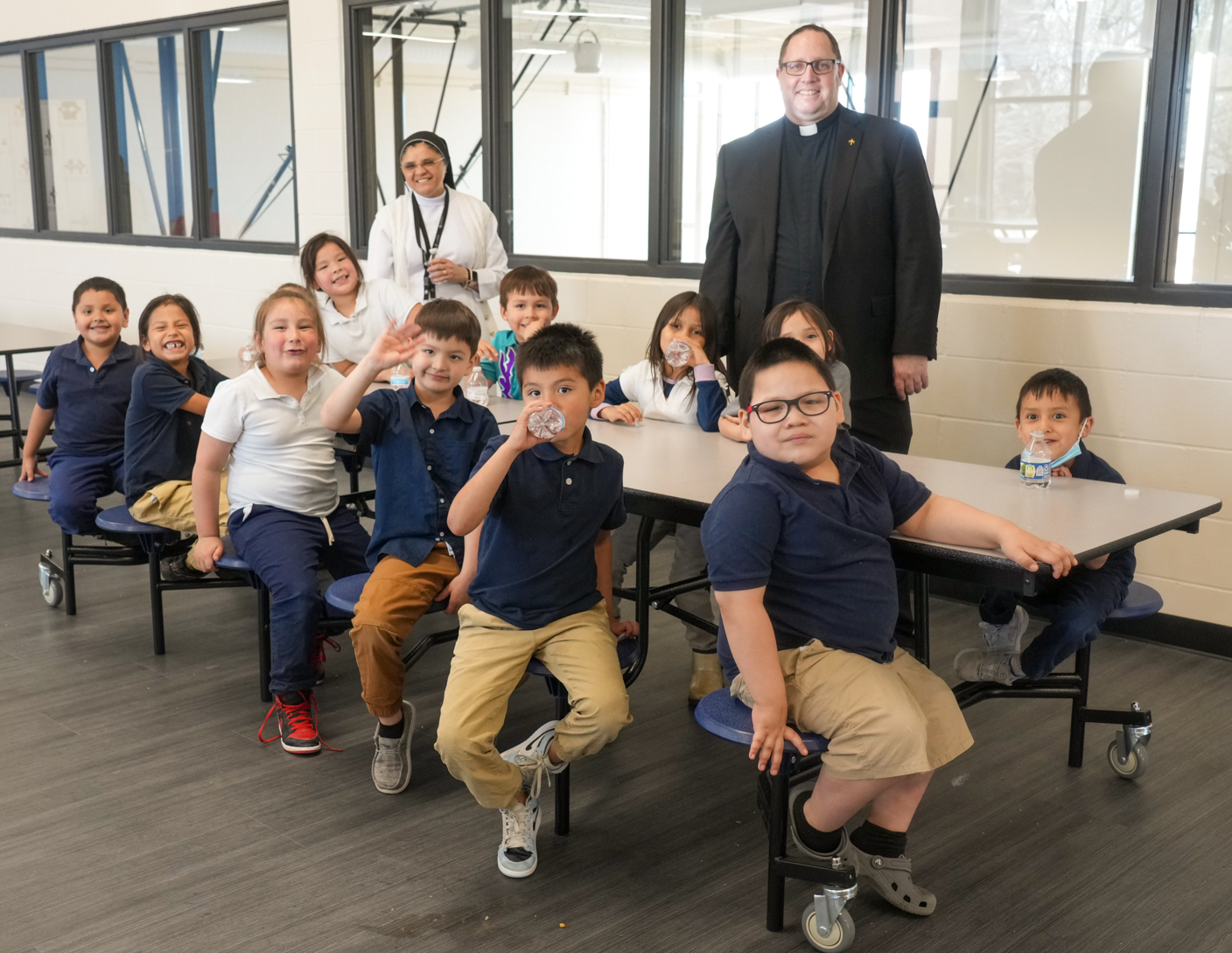
Father Mark Beran and Sister Suelene Matos pose with students at Saint Augustine Indian Mission during the dedication of the mission’s new school in April 2023.
News
Q&A: How Catholic schools in northeast Nebraska are empowering underserved students
July 29, 2023
Last year, Catholic schools across the Archdiocese of Omaha’s 23 counties served over 3,000 students who qualified for free-and-reduced lunch, according to the Archdiocese of Omaha Catholic Schools Office. Across the 23 counties in the archdiocese, nearly 21,000 school-age children growing up in poverty.
The percentage of students growing up in poverty at some Catholic schools can be as high as 100%.
Nebraska lawmakers this year enacted LB753, The Opportunity Scholarships Act, making new scholarship dollars available for students in poverty to attend private schools. The scholarships are provided by donations to scholarship organizations, and donors to those organizations receive a dollar-for-dollar tax credit for their donations each year.
The Catholic Voice recently interviewed two educators in the archdiocese for their insights on the impacts of Catholic education on students growing up in poverty and their perspectives on LB753, which is the target of a petition drive seeking to undo the law.

Andrew Bauer
Andrew Bauer is Director of Education at the Omaha Consortium of Catholic Schools, comprised of Holy Cross, Our Lady of Lourdes, St. Bernadette, Saints Peter and Paul, St. Thomas More and Dual Language Academy. He served for six years as principal at Saints Peter and Paul School in South Omaha and previously worked at Marian High School.

Deacon Don Blackbird
Deacon Don Blackbird is principal at St. Augustine Indian Mission in Winnebago, where he has worked for the past 25 years. Blackbird was a graduate of the school he now leads. This fall the roughly 100 students at St. Augustine will begin classes for the first time in a newly dedicated, $10 million school.
WHAT HAS POVERTY LOOKED LIKE AT THE SCHOOL WHERE YOU SERVE?
BAUER: At Saints Peter and Paul, we had 85% of our families that qualified for Free and Reduced Lunch when I was there, and we qualified, and still do, under a special provision called the Community Eligibility Provision, where all students are free regardless of (status). (Saints Peter and Paul) is the highest school out of the consortium schools for Free and Reduced Lunch. We have families that apply for the Children’s Scholarship Fund, and there’s more demand than there is funding to be able to give out scholarships. I think that demand speaks volumes to – that there are families who are desiring to attend a Catholic school and registered and are not necessarily receiving Children’s Scholarship Fund now. We work with all families right – we don’t want any family who wants a Catholic education for their child to be turned away, but by the same token, there there are limited numbers of scholarships available, and so when families who qualify based upon financial need aren’t getting a funded scholarship, we have to provide financial aid or scholarships through other means to meet that demand. And so I think that shows that there are families desiring this and really wanting to send their kids to Catholic schools, but there’s a limited pool out there. Children’s Scholarship Fund does great work and does an amazing job with the scholarships they do give, but there are still unmet needs out there just based upon the amount of scholarships they’re able to give.
BLACKBIRD: At St. Augustine’s, the typical family qualifies for free and reduced meals so they fall under the federal guidelines for poverty – the majority of our students. I would say 99% of our students are Native American children or of Native American ancestry, primarily from the Winnebago tribe or the Omaha tribe. The communities themselves also have higher-than-state-average levels of poverty that have to be addressed and overcome, and so the majority of our students who come to our school qualify for free and reduced meals based on the federal guidelines, and we don’t turn students away simply because they’re unable to pay for their education. Mission’s in the name, but the reality of it is, for us right now, it costs about between you know $10,000 and $15,000 a year to educate a child. We ask our families to contribute $500. The rest is paid for by donors who support their academic success.
WHAT IMPACT HAVE YOU SEEN CATHOLIC SCHOOL EDUCATION HAVE FOR STUDENTS GROWING UP IN POVERTY?
BAUER: The most striking thing to me is that there were many times when sitting with the family working with them and trying to help empower them to make sure that their child succeeds that (the impact) came to light in conversation. I can think of one example at a parent-teacher conference recently, where the parents were articulating how their child – even in middle school – had surpassed the parents’ formal education. So to see that background of the parents, knowing that their child has already overcome the formal education of the parents even in sixth, seventh, eighth grade, and then seeing what that child’s doing in the classroom, it’s really one of the biggest blessings and most amazing things that I’ve seen as an educator. To see parents who haven’t surpassed sixth or seventh grade, and their eighth-grade child is in the classroom succeeding reading “All Quiet on the Western Front,” producing great reports, prepared to go on to a Catholic High School or any high school for that matter, it’s really one of the most beautiful things about what I did as principal. Just seeing that parent wanting the best for their child and wanting them to be successful and have opportunities that they maybe didn’t have for whatever reason, and then you know comparing that with the experience of that child in the classroom and seeing their responses – seeing the work they’re producing – it’s just really amazing. It’s very, very powerful.
BLACKBIRD: When we look at the dynamics of family and how it changes over time due to the influence of education, it’s not something you typically see in a short timespan but what you see develop over a period of generations. I would say we’ve definitely seen an increase – I wish we could take full credit for it – but we’ve seen some incredible increases here in the Winnebago community of our young people graduating from here, going on to high school, going on to college and finding their success there. And with our students having a higher high school graduation rate, greater success at college because of availability of access to college that the tribe has helped facilitate through business, through transportation, through the creation of their own, they have a tribal college here in the community where they have put a lot of effort into creating degrees and fields that the tribe and the tribal corporation Ho-Chunk Inc. is providing jobs. Things like marketing management, renewable energy resources, things like that, they’re providing jobs in early childhood education, and so the college here has created programs that the students can come through like our school, go to the local high school, go to the tribal college and get certified and get degrees in areas where there are jobs available here in the community. Then we start building a talent base that’s feeding back into the community and able to grow up future leaders, and we’ve seen that develop over the last 40 years. What we’re actually seeing in terms of the poverty rate here on the Winnebago reservation is over the last 30-40 years, the poverty rate has decreased as education and job opportunities have increased here on the reservation, and the tribe has worked to make that a focus of the community, of developing their young people. We still have people struggling financially and trying to find work, but the thing that we have to also focus on here at St. Augustine is we serve both the Winnebago and the Omaha tribal reservations, and the Winnebago community has made incredible strides, and so we see fewer of our young people actually qualifying for free and reduced meals because the parents suddenly have jobs have in advanced degrees and have opportunity that wasn’t here before. Myself, I’m a former St. Augustine student, so I’m a product of the mission school here and I know that many of the other people that I went through school here with when I was a student have gone on to other leadership roles within the community – be it in education, tribal leadership, law enforcement, medical fields, businesses – they go on to become productive members of the community and eventually ascend to leadership roles within the community. We’ve been very successful with that for our students. I’ve been able to have a direct impact on as the teacher and principal. Now the students who I taught when I first started teaching, their children are now enrolled in the school here – so I’m a grand teacher.
WHAT DO YOU THINK OF THE OPPORTUNITY SCHOLARSHIPS ACT (LB753)?
BAUER: It’s a great thing. As Catholics, we believe that parents are the primary educators, and we really support parents and their role as primary educators as Catholic school educators. The Opportunity Scholarships Act allows not just Catholic families because we have many students in our Catholic schools that aren’t Catholic or Christian, or who even have another faith background, the opportunity to, if they don’t have the resources to get more access to scholarships when the demand is there to attend a school that aligns with and is the best fit for their child’s needs and their wishes as a parent. I really strongly believe in my role as principal that it’s not us versus them. Public school educators are doing great things, and I have a child who has an (Individualized Education Plan) who is in a public school because that’s the best fit for him at this time. But it isn’t always the case for some families if they live in a district where their local school option doesn’t align with the values they want or maybe the educational outcomes, and that this law allows those families, especially of low-income and underserved students, to have that opportunity to choose a school that better aligns with what their wishes are as the primary educators of their children.
BLACKBIRD: I’ve previously gone down to the state capitol and provided testimony in support of Opportunity Scholarships because I believe in the equalizing power of really good Catholic education, of good faith-based education, the quality of education that faith-based schools can provide. I’ve given testimony at the capitol building about that, and my focus was also on the history of what happens to children when the choice of educational opportunities is taken out of their hands, speaking specifically to Native American children who were taken from their home and sent off to school someplace else. They didn’t have a choice in the education of their child, and one of the reasons St. Augustine was built is because they wanted a local place that could provide education when the government wasn’t providing that, and so St. Augustine has a history of trying to provide a solid faith-based education at the request of the families themselves. And when that ability to choose education is taken out of the hands of the parents, bad things have a tendency to happen.
WHAT DO YOU WISH NEBRASKANS KNEW ABOUT LB753?
BAUER: A couple of the myths that I have heard is that, “It’ll take away the public funding from the public schools,” and that just simply isn’t the case. The public funding for the schools will be under the same paradigm that it has been, and those schools will get funding, and actually, if you look at it from a macro perspective, the more students attending non-public schools, it alleviates some of those budgetary concerns for the public schools, and then reduces class sizes and hopefully brings best educational outcomes for everyone. I think another myth that I’ve heard is that “It will just give scholarships to families that already have the money.” It’s just simply not the case. It’s designed to go to families of the highest need, and it’s also not directly using public dollars to fund private schools. It’s actually just giving parents the ability to have a scholarship to attend a non-public school, but it’s not funding non-public schools with state dollars. It’s really not, it’s not direct funding, and I think that those are the biggest myths, and I think that’s just the number one thing is that in my experience, the families that will benefit the most from the outcome of this law are the families in most need of a school better aligning with their wishes for their children.
BLACKBIRD: Some people are portraying this as private school kids – basically rich children – being given more money to go to schools, and the poor public school students are being sacrificed because of it. Nothing could be further from the truth. The Opportunity Scholarship, with the way it’s targeted towards those in most need, I just see that it’s another opportunity for parents to provide for those children, who want their children to receive the equalizing opportunity of a good Catholic education. This law will provide them that opportunity that they may not otherwise have, and I don’t see an obstacle with that because I myself am a product of a faith-based education thanks to the support of other people because my family would never have been able to support (the cost) themselves.
LEARN MORE ABOUT HOW YOU CAN SUPPORT STUDENTS IN NEED
SUPPORT THE ST AUGUSTINE MISSION
SUPPORT THE OMAHA CONSORTIUM OF CATHOLIC SCHOOLS
READ MORE FROM THE CATHOLIC VOICE